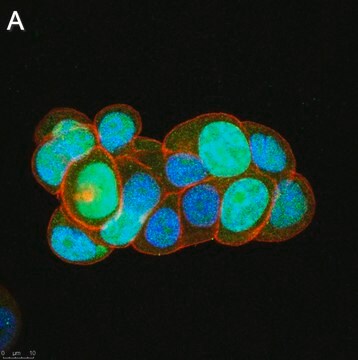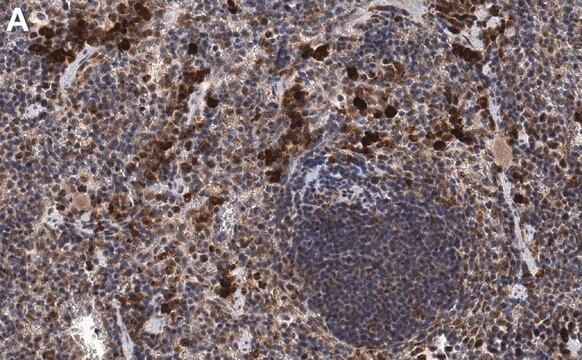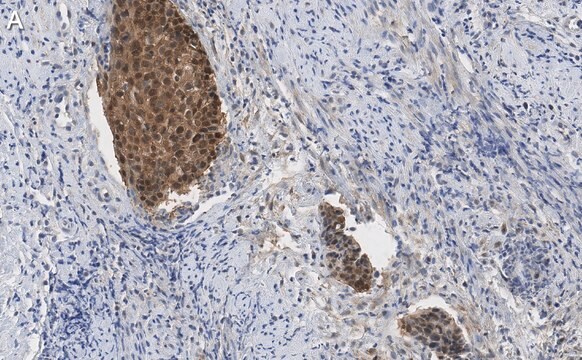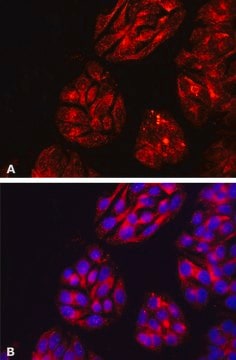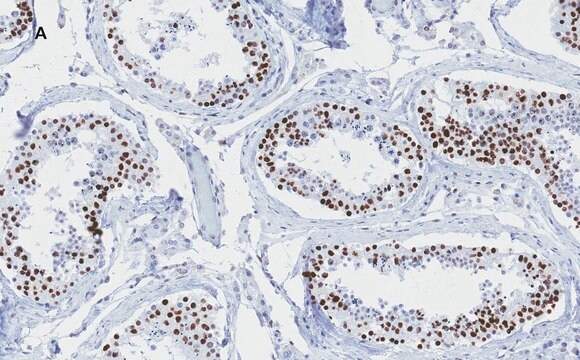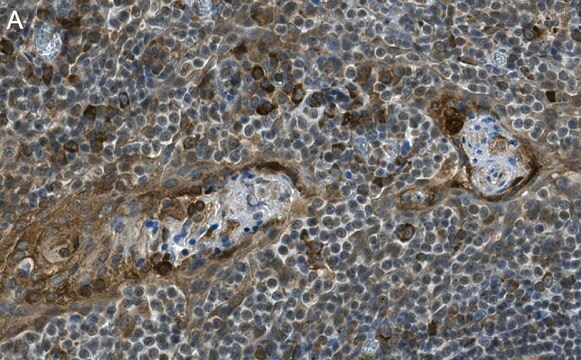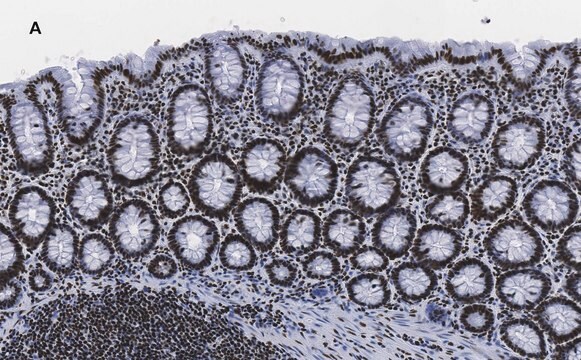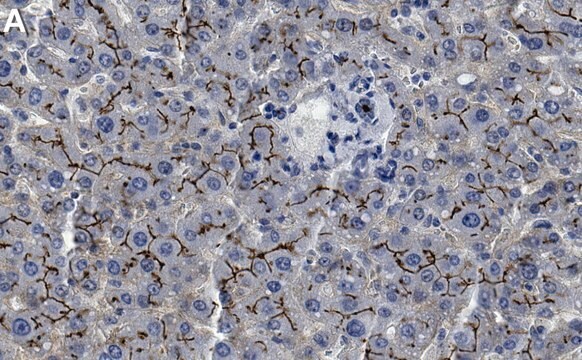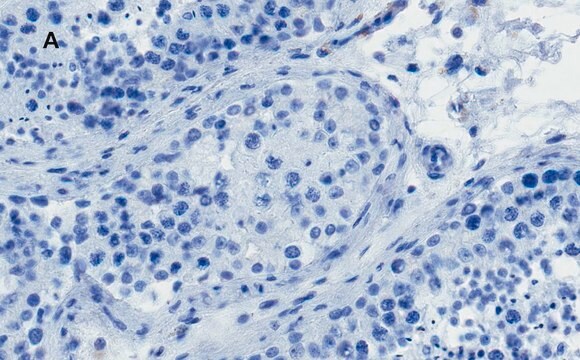詳細
We are committed to bringing you greener alternative products, which adhere to one or more of The 12 Principles of Green Chemistry. This antibody is Preservative-free, produced without the harm or sacrifice of animals and exceptionally stable to allow for ambient shipping and storage if needed and thus aligns with "Waste Prevention", "Designing Safer Chemicals" and "Design for Energy Efficiency".
Click here for more information.
ZooMAb® antibodies represent an entirely new generation of recombinant monoclonal antibodies. Each ZooMAb® antibody is manufactured using our proprietary recombinant expression system, purified to homogeneity, and precisely dispensed to produce robust and highly reproducible lot-to-lot consistency. Only top-performing clones are released for use by researchers. Each antibody is validated for high specificity and affinity across multiple applications, including its most commonly used application. ZooMAb® antibodies are reliably available and ready to ship when you need them.
特異性
Clone 1C7 is a ZooMAb® rabbit recombinant monoclonal antibody that specifically detects Phosphoserine aminotransferase (PSAT1). It targets an epitope within the internal region.
免疫原
His-tagged recombinant fragment corresponding to 299 amino acids from the internal region of human Phosphoserine aminotransferase (PSAT1).
アプリケーション
Quality Control Testing
Evaluated by Western Blotting in A549 cell lysate.
Western Blotting Analysis: A 1:1,000 dilution of this antibody detected PSAT1 in A549 cell lysate.
Tested Applications
Western Blotting Analysis: A 1:1,000 dilution from a representative lot detected PSAT1 in Human brain tissue lysate.
Immunofluorescence Analysis: A 1:1,000 dilution from a representative lot detected PSAT1 in human kidney tissue sections.
Immunohistochemistry (Paraffin) Analysis: A 1:1,000 dilution from a representative lot detected PSAT1 in human kidney tissue sections.
Western Blot using lysates from wild-type(WT) and PSAT1 knockout cells: A 1:5,000 dilution from a representative lot detected PSAT1 in lysates from NSCLC cells and NSCLC cells with PSAT1 knock-down and transfected to re-express WT PSAT1, but not in PSAT1 knock-down or mock transfected cells. (Data courtesy Dr. Brian Clem, University of Louisville)..
Note: Actual optimal working dilutions must be determined by end user as specimens, and experimental conditions may vary with the end user.
ターゲットの説明
Phosphoserine aminotransferase (UniProt: Q9Y617; also known as EC:2.6.1.52, Phosphohydroxythreonine aminotransferase, PSAT) is encoded by the PSAT1 (also known as PSA) gene (Gene ID: 29968) in human. PSAT1 is a class-V pyridoxal-phosphate-dependent aminotransferase family member that catalyzes the reversible conversion of 3-phosphohydroxypyruvate and to 1-phosphoserine, as well as the conversion of 3-hydroxy-2-oxo-4-phosphonooxybutanoate to 4-phosphonooxy-L-threonine, using, in both cases, L-glutamate as an amine group donor, which is then converted to 2-oxoglutarate. It is expressed at high levels in the brain, liver, kidney, and pancreas, and displays weak expression in the thymus, prostate, testis, and colon. PSAT1 is involved in serine biosynthesis from glycolytic intermediates and is upregulated in non-small cell lung cancer (NSCLC), esophageal squamous cell carcinoma, and colon cancer cells. Higher expression has been linked to enhanced cell proliferation, metastasis, and chemoresistance. Knockdown of PSAT1 is reported to suppress the proliferation of MDA-MB-468 and BT-20 breast cancer cells. This ZooMAb® recombinant monoclonal antibody, generated by our propriety technology, offers significantly enhanced specificity, affinity, reproducibility, and stability over conventional monoclonals. (Ref.: Gao, S., et al. (2017). J. Exp. Clin. Cancer Res. 36; Article 179; Vie, N., et al. (2008). Mol. Cancer. 7: Article 14).
物理的形状
Purified recombinant rabbit monoclonal antibody IgG, lyophilized in PBS with 5% Trehalose, normal appearance a coarse or translucent resin. The PBS/trehalose components in the ZooMAb formulation can have the appearance of a semi-solid (bead like gel) after lyophilization. This is a normal phenomenon. Please follow the recommended reconstitution procedure in the data sheet to dissolve the semi-solid, bead-like, gel-appearing material. The resulting antibody solution is completely stable and functional as proven by full functional testing. Contains no biocide or preservatives, such as azide, or any animal by-products. Larger pack sizes provided as multiples of 25 µL.
再構成
300 µg/mL after reconstitution at 25 µL per vial. Please refer to guidance on suggested starting dilutions and/or titers per application and sample type.
保管および安定性
Recommend storage of lyophilized product at 2-8°C; Before reconstitution, micro-centrifuge vials briefly to spin down material to bottom of the vial; Reconstitute each vial by adding 25 µL of filtered lab grade water or PBS; Reconstituted antibodies can be stored at 2-8°C, or -20°C for long term storage. Avoid repeated freeze-thaws.
法的情報
ZooMAb is a registered trademark of Merck KGaA, Darmstadt, Germany
免責事項
Unless otherwise stated in our catalog or other company documentation accompanying the product(s), our products are intended for research use only and are not to be used for any other purpose, which includes but is not limited to, unauthorized commercial uses, in vitro diagnostic uses, ex vivo or in vivo therapeutic uses or any type of consumption or application to humans or animals.

